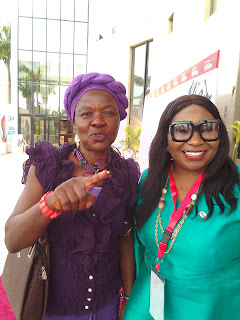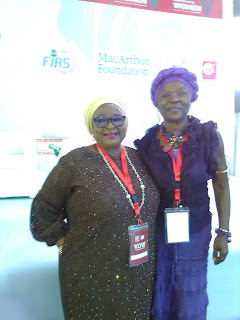The Voice of Women (VOW) conference is an annual gathering of women and he for she's for the advancement of the female gender and indeed humanity. The seventh edition of the VOW initiative was held at the Nigeria Air Force (NAF) Centre, Abuja on the 25th of October 2023. Kudos to Mrs. Toun Okewale-Sonaiya, the humble and self-effacing CEO of the very first and only Women's Radio so far in Nigeria for painstakingly putting together this remarkable programme yearly! I was a valued participant.
This year's edition was chaired by Erelu Bisi Adeleye-Fayemi, former First Lady of Ekiti state. In her enervating speech, Erelu noted that Nigeria features poorly on most global indicators measuring Gender Equality and Women's Empowermnet (GEWE). The most recent Global Gender Gap Index (GGGI) 2023, ranks Nigeria 130th out of 146 countries! The GGGI tracks Economic opportunities, Education, Health and Political leadership. Nigeria has one of the highest maternal and infant mortality rates in the world at 12% of global figures, right after India that has 17%. Nigeria also has the highest number of child brides at 22 million, the highest in Africa and 11th globally! With this dismal picture of the plight of the female gender in Nigeria, many of the speakers proffered their solutions...
L-R:
Dr. Dayo Oluyemi-Kusa &
Counsellor Yemi Adenuga (1st Irish-Nigerian Counsellor in
Ireland)
Some of the participants are:
*
Alh. Ibrahim Shettima - VP, Nigeria, Represented by Dr. Salma Ibrahim - Special Assistant to the President on Health
*Mrs. Toun Okewale-Sonaiya - Convener/CEO Women Radio
*Erelu Bisi Fayemi - Chairperson/Former 1st Lady of Ekiti state
*Hon. Maureen Magreth Hinda-Mbuende - Deputy Minister of Finance & Public Enterprises,
Namibia
*Dr. Margaret Karungaru - Commissioner, National Gender & Equality Commission (NGEC),
Kenya
*Counsellor Yemi Adenuga - Councillor, Meath County Council, Ireland
*Mufuliat Fijabi - ED, Sustainable Gender Action Initiative (SGAI)
*Amb. Prof. Olufolake Abdulrasaq - Chairperson Nigeria Governors' Wives Forum
*Chief Mary-Maudline Nwifuru - 1st Lady, Ebonyin state
*Hajia Zainab Nasir - 1st Lady, Kebbi state
*Barr. Chioma Uzodimma - 1st Lady, Imo state
*Mrs. Bamidele Abiodun - 1st Lady, Ogun state
*Hon. Nkiruka Onyejeocha - Minister of state, Nigeria
*Dame Pauline Tallen - Former Minister of Women Affairs
The conference brochure
Mrs. Yemi Adenuga, the first Irish-Nigerian to become a Counsellor in Ireland said as a mother of two sons and two daughters, she started by working in schools. She addressed the issue of bullying in school. It took over two years of persuasion before the schools could open up to her to make a positive impact on the issue of bullying. Kids of colour were routinely victimised in schools. Yemi built roots for her children in Ireland. She founded 'Sheroes.' She also got involved in the
Black Irish Sisters' network. Yemi joined Fingel, the ruling Party in Ireland.
Yemi said she did it afraid - campaigning as a black, inexperienced politician. She gave the following advice to incoming politicians: *No one will hand power to you a la carte, fight for it and take it by force. *Be strategic *She never thought she could be a politician, but the living conditions of blacks (especially black females) in Ireland triggered her interest in politics. *She had a supportive husband *Wanted a bigger platform to do good in the society. *Encountered extreme discrimination and racism. *It was very difficult canvassing. * Yemi campaigned from door-to-door. *Don't let distractions get to you. *Women should support their own. *But the Black community did not automatically support her. *Start your campaign early. *Encourage/teach women to register to vote and win their 'pain points.' *Lift people out of poverty. Yemi gave full support for the women agenda in Nigeria.
Dayo @ the venue of the VOW conference
There was the fire side chat with Fellows of the McArthur Foundation. The theme of the parley was 'leveraging on technology.' The section was anchored by Ajibola Hamzat from the African Centre for Investigative Journalism, The Fellows used journalism as a tool for interrogating social issues, The Fellows were:
*Angela Apollo
*Hadiza
*Yahaya Abubakar
*Blessing Oladunjoye
L-R: Mrs. Moji Makanjuola (Broadcast journalist) & Dr. Dayo Oluyemi-Kusa
HIV positive Boko Haram survivors in Kano were studied. It was a difficult exercise, since many of them tried to hide their identity because of the stigma attached to their condition. Also in Kano newly married wives who get pregnant are forced to abort such pregnancies by their husbands! Education is inaccessible to them. There's a high rate of divorce in Kano state. In Imo state, the sit-at-home order has eaten into the capital of abacha (local salad) sellers significantly. From the hinterland to Owerri, shops are closed. Those who contributed to Esusu (thrift cooperative) could not be paid.
The budget for education in many states is only 1%. In some communities, there's no Secondary school. Girls embark on very long walks to school and they could be raped, beaten and/or killed on their way to and from school. Some solutions were proffered: Community policing should be embraced; Nnamdi Kanu should be released; Hisba (local police) should continue to stand in the gap, while being less
dramatic.
Governor Abdurahman Abdulrazaq, Governor of Kwara state was the formidable he for she at the event. There is six months maternity leave for women in Kwara state. Constituency that features highest number of women in elections receives $5m. $3m is given for transparency in budgeting. This is a whole lot of encouragement for women in Kwara state.
There was experience sharing by delegates from other African states:
Namibia is number one in Africa and number six in the world as regards the inclusion of women in decision-making and governance. There are numerous revolving loans for micro-credit for women. There are also many housing schemes for the female gender. There are many female-headed households. There are cross-cutting interventions all over the country. Four seats are reserved for women in each County. Humility is silent strength. If you are humble, you can carry your male counterparts along.
Kenya: The head of the National Gender & Equity Commission is a woman. Women are constantly negotiating with men for more inclusion.
Liberia: There are Constitutional provisions for the inclusion of women in the political space. There are schemes for the financial inclusion of women. One female legislator can take at least three men to lunch in order to facilitate effective lobbying for greater inclusivity for women...
The camaraderie exhibited at the conference between and among Nigerian female legislators and decision-makers and their counterparts from other African countries was indeed a pleasing sight to behold. This trend needs to continue. Thanks to Toun Okewale-Sonaiya and her team for bringing women's issues to the fore through her Radio station, W FM 91.7 and yearly VOW conference...

.jpg)


No comments:
Post a Comment